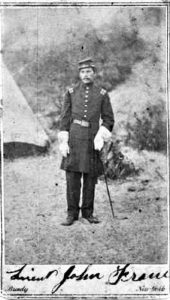The Civil War: Slow times and a different type of shot


By Sandy Vasko
Summer on the battle fronts for Will County troops was uneventful. The boys had been through a type of hell, and had the chance, finally, to decompress, mentally and physically. We join the 39th in June of 1862.
Of course, while not engaged in battle, the 39th in Virginia had other duties. One of them was to patrol for whisky. George Woodruff in his book “Fifteen Years Ago, the Civil War in Will County,” describes this task:
“Whisky had been made contraband of war, and was also excluded by military edict from the army lines, at least from the rank and file of the army. Hence it was part of the duty of officers and men, when doing provost work, to hunt it up, and destroy or confiscate it, and get into safe hands.
“Now, in the 39th, as in most other regiments, there were some who had a fondness for the contraband, and many were the devices of such to hide it from the provost details. It is said that some were in the habit of hiding their canteens in the tents of the officers, well knowing that no one would think of looking in them for anything contraband, and that there they would be perfectly safe.
“Well, one day, a private of the regiment was returning to the camp from a foraging expedition. He was a good and brave soldier, but sadly fond of contraband, and his gait and general appearance now showed plainly that he had somewhere got hold of some of it. In this plight he was met by the colonel, who, seeing his condition, felt bound to call him to account. He therefore halted him, charged him with being drunk, and demanded of him where he had got his whisky.
“The man stoutly denied the charge, although his speech and manner testified sadly against him. The colonel was somewhat taken aback by the man’s bold denial, and was about to pass on, when he discovered that the man was trying to conceal his canteen. He then demanded of him what he had got in his canteen. ‘Nothing,’ was the unblushing reply.
“Nothing,” says the colonel, “hand it up and let me see.” The man had no choice but to comply, and a slight examination only was required to demonstrate that it was full of whisky. Enraged at the man’s mendacity, he asked him what he meant by lying so. The soldier avowed that he had not lied. “Not lied,” said the colonel, “why, you told me that you had nothing in your canteen, and here it is full of whisky. What do you mean?” “Oh,” said the soldier,” this is not my canteen; my canteen is in my tent.”
“Not your canteen; then whose is it, sir?” demanded the colonel. “Oh this is Major Munn’s canteen!”
The colonel confiscated the canteen and contents, and rode on.
Men from the 39th were also allowed passes to visit the local points of interest. The men of Company E explored a local cave, describing, “All along are numerous scenes of interest and beauty; but now, after much creeping and scrambling through small and large passages, and down many steep, rough stairways, we find a large apartment which in splendor and brilliancy far surpasses everything else we have seen.
“The stalactites hang down in clusters and bunches all around from the roof and sides. There are numerous columns, all figured and carved off, supporting the roof above; and also numerous statues, which at a little distance have the appearance of finely carved images. This room in the dim light of our candles, have the appearance of a splendid long hall set with gold, diamonds and precious stones.”
“We emerge from the dark cavern below, inhabited only by bats and eyeless insects, where never a ray of sunlight penetrates, feeling that though there was beauty and splendor hidden far down below, to repay him who would toil for it, still there was far more, freely spread out for us all in the bright light of day, and the varied scenes of nature which daily meet the eye. We were muddy and weary, but felt well satisfied with our explorations and the sights we had seen.”
Some got furloughs home, while others spent the quiet time writing letters home. In a letter dated June 3, 1862, printed in the Wilmington Independent, an anonymous writer gives us a view of camp life for the 39th in Virginia:
“Here we are again, after a long march of 360 miles, in the same place which we left three weeks ago, trying to clean out the Shenandoah Valley once more. Such are the uncertain fortunes of war. These marches and counter marches, advances and retreats, and complicated movement, reminds me of two persons playing chess. One moves boldly up in front, then, for fear of being checkmated by the maneuvers of his opponent, he moves back in another direction. Then he moves carefully around to the side, and throws out baits to draw his opponent into a trap. Such has been the movements of our Generals, dodging around through the mountains, is playing the rough game of war with the rebel Gen. Jackson.
“Most of our marches were over 20 miles a day. Some of them were night marches, through rain and mud, and over the roughest kind of roads. Our wagons were often behind, so that we had to do without blankets and rations. Our rations have been very scanty for the last 3 weeks, hardly anything save hard crackers, sometimes not enough of those; a little sugar and coffee, and now and then a ration of beef.”
At the end of the month, another letter was printed from the same person: “When we arrived at Luray, the bodies of two men who had been murdered by the rebels were found concealed in the woods, near that place. One of them was Mr. John F. Haynes, a prominent and respectable citizen of Page County.
“The day after our division left Luray, on the way to Fredericksburg, 16 of the Louisiana Tigers come to Haynes’ house and asked permission to stay all night. He told them he would keep as many as his house would accommodate. After searching his house, part of them left and part remained. They questioned him with regard to his politics. He confessed that he was a Union man.
“They left in the morning, but returned in the evening accompanied by a neighbor. He was taken prisoner to Luray, where he remained some eight or ten days. At night two men come to the jailor and demanded the key, saying that they had orders from Col. Ashby to remove two prisoners, Haynes and Belor. The key was brought, and the prisoners taken a mile and a half from town, and there murdered. We were informed that at a meeting of the citizens of Luray it was resolved to have the above-named prisoners killed. Such outrages as these which are constantly occurring shows the fiendish hatred which the secessionists bear towards all who entertained Union sentiments.”
Our correspondent then goes on to give his opinion of those who enlisted, but when things got tough, resigned their commissions.
“In my last communication I forgot to speak about the change in the company. Officers of our regiment which took place during our long march from Luray to Fredericksburg, and back again. Four captains, among the number Captain Hooker (from Florence Township) of Company E, and four lieutenants, resigned, and their places were filed by the promotion of lieutenants and sergeant. Eight company officers out of twenty-seven resigned almost at once.
“They held their places and drew their pay till they began to feel some of the hardships which the private always has to undergo, and then, when the prospect was that they would be greatly needed and there appeared to be hard and dangerous service just ahead, they took advantage of their privilege and bade us farewell.”
“Since writing the above orders have come for us to march to Alexander; and then Ho! For Richmond!”
